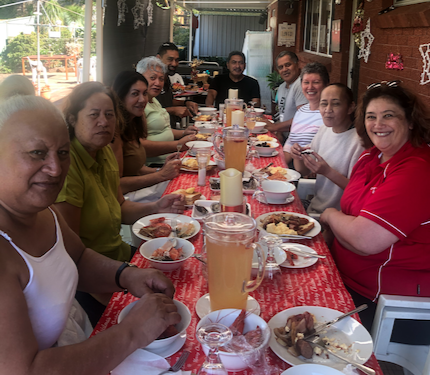
Ministry Team Christmas breakfast @ the Vicarage


Sunday Services 10:30am at 587 Elizabeth St, Redfern, Sydney

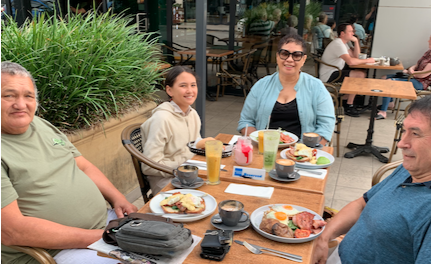
Christmas Brekkie instead of our Christmas Hamper, thank you Marcia, Pierre and Greg from the Church

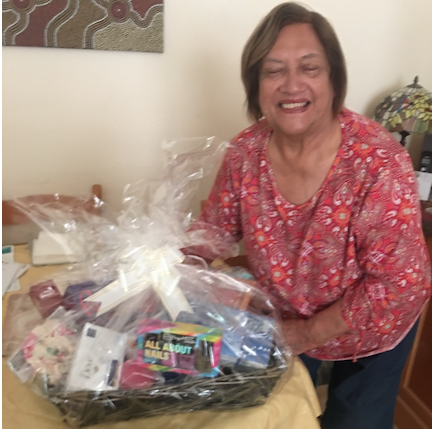
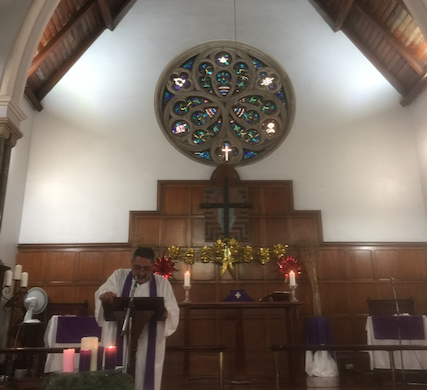
The Forerunner!
Readings:
Isaiah 40:1-11
Psalm 85:1-2,8-13
2 Peter 3:8-15a
Mark 1:1-8
Sentence:
Prepare the way of the Lord; make his paths straight. For the glory of the Lord shall be revealed, and all people shall see it together. Luke 3:4; Isaiah 40:5
Collect:
God for whom we wait and watch, you sent John the Baptist to prepare for the coming of your Son: give us courage to speak the truth even to the point of suffering. This we ask through Christ our Saviour. Amen.
Gospel from Mark 1:1-8
The Proclamation of John the Baptist
The beginning of the good news of Jesus Christ, the Son of God. As it is written in the prophet Isaiah, ‘See, I am sending my messenger ahead of you, who will prepare your way; 3the voice of one crying out in the wilderness: “Prepare the way of the Lord, make his paths straight”, 4John the baptiser appeared in the wilderness, proclaiming a baptism of repentance for the forgiveness of sins. 5And people from the whole Judean countryside and all the people of Jerusalem were going out to him, and were baptized by him in the river Jordan, confessing their sins. 6Now John was clothed with camel’s hair, with a leather belt around his waist, and he ate locusts and wild honey. 7He proclaimed, ‘The one who is more powerful than I is coming after me; I am not worthy to stoop down and untie the thong of his sandals. 8I have baptised you with water; but he will baptise you with the Holy Spirit.’
Tena koutou katoa e te whanau o Te Wairua Tapu.
Well whanau, I don’t want to be the bearer of bad news but we won’t be having karakia at the church until work is completed on the roof. There is far to much dust falling since the roofies stripped off all the slate tiles. So, we will keep you informed as to when we will return.
Last Sunday was the First Sunday of Advent and we heard about the sun being darkened, the moon no longer giving it’s light, the stars falling from the sky and the powers of heaven being shaken. It’s the end. That’s probably how some us felt when we closed the church last Sunday. It was hard enough when we were closed for Easter. Now it looks like we won’t be celebrating Christmas together as the body Christ at Te Wairua Tapu! But it’s not the end of the world or the end of life. It’s rather an ending of our story for another year. Not the way we planned it but here we are. You see, we have heaps of stories, events and experiences that have shaped and continue to form who we are, how we are, and the ways in which we see and relate to God, the world, each other and ourselves. Every story we have gives us meaning, identity and direction.
Sometimes, however, our stories can no longer support our lives. Instead of growing our lives they stop our growth and can no longer take us no further. It’s not that they are necessarily bad or wrong, it’s just that we need a different story, a bigger story and a life giving story. In some ways we are always living into that new story. That means we must let go of our stories so that a new story can be told, a new life can be lived and “the one who is more powerful” can come to us. That’s hard work and it’s often painful. Most of us hold onto our stories pretty tightly even when they are no longer helpful and often in spite of the harm they cause us. We cling to our stories believing that any story is better than no story. Letting go of our old stories, is what today’s gospel calls “preparing the way of the Lord.” It’s the way by which we re-calibrate our lives to “the one who is more powerful.”
If last week’s gospel revealed Advent to be a season of necessary endings, then this week’s gospel reveals Advent to be a season of time in the wilderness. It’s not by accident that today’s gospel takes us to the wilderness. Our meeting with John the Baptist is no fluke. The lectionary, the assigned scripture readings for each Sunday, is not simply luck of the draw. There is a particular sequence between last week, the First Sunday of Advent, and today, the Second Sunday of Advent. It’s a movement that takes us from an ending to the wilderness. It reflects the reality of our lives. It’s a sequence I know well. Whenever I have accepted an ending of one of my stories I have always ended up in the wilderness. Overwhelmed and a bit lost, vulnerable and at risk, a bit afraid, angry and resentful. The old story ends and the new one starts but not totally clear. I am always in that in-between space waiting to see what might happen. Whether or not I know it, I wait for “the one who is more powerful.” Waiting for Jesus.
I reckon most of you reading this know what I mean. You could all speak about a time in the wilderness. Think about your own stories – the ones that have ended or the ones that are ending – and you’ll understand what I’m talking about. The most significant changes and transitions in our lives lead us to the wilderness. As difficult as the wilderness maybe it’s the place in which we prepare the way of the Lord. After the Israelites left Egypt they went to the wilderness. It was their preparation for the promised land. After Jesus was baptised he went to the wilderness. It was his preparation for his public ministry. And in today’s gospel, John the Baptist appears in the wilderness helping the people prepare for the coming of “the one who is more powerful.” That’s what time in the wilderness does. It prepares the way of the Lord.
Time in the wilderness seems to be the norm for God’s people. Wilderness time doesn’t make “the one who is more powerful” show up. It insures that when he does we will be there, we will be ready and we will have shown up. The wilderness isn’t the geography around us but the geography within us. It’s our interior landscape. There is no where to hide in the wilderness. There are no illusions or distractions. The wilderness strips us of all pretense and we are left to face up to ourselves, to examine our hearts and to confess the truth about our lives.
The wilderness isn’t a place of exile or punishment, it’s a place of self-discovery. We discover that we can no longer live by our own self-sufficiency. That doesn’t mean we are deficient or insufficient. It means there is more to life and more to us than what our own self-sufficiency can give. Many of our stories have, however, convinced us that we are or should be self-sufficient. The wilderness always proves otherwise. In the wilderness we ultimately discover that we are in need of and have no where else to turn but to “the one who is more powerful.” It reveals that our self-sufficiency is our downfall.
Maybe that’s why John the Baptist is our wilderness guide and why he is called the Forerunner of Christ. That’s why he is the voice crying out in the wilderness, “Prepare the way of the Lord, make his paths straight.” John knows what he’s talking about. Look at him – clothed with camel’s hair and a leather belt around his waist, eating locusts and honey. That’s more than a description of his wardrobe and diet. It reveals the state of John’s heart and it shows that he has let go of all of his pretense. He knows he’s dropped all of his defences and he entrusts everything to “the one who is more powerful.” So much so that he declares himself unworthy to even untie Christ’s sandals. You see, when we let go, the wilderness opens our minds to a bigger story, opens our heart to a new life and turns our gaze to the one who is coming. It frees us of pretense, pre-occupations and the accumulations of life that weigh us down. It restores to us the original beauty of our creation and creates space, time and place for the one who is coming.
What stops us from allowing Christ to come to us is the power of our own self-sufficiency, which is usually disguised as busyness, we have no free space in our diaries, the never ending to do lists and the exhaustion that permeates so many of our lives. It’s at the core of many of the judgments we make about others. The unending search for approval, recognition, and accomplishment is driven by a story of self-sufficiency. Of course, we aren’t helpless. We have responsibility for ourselves and to others. We have resources and abilities. But we live overly self-sufficient lives that we close ourselves off. We isolate, therefore, we declare the way of the Lord to be a closed road. Maybe the greatest tragedy is that when we live from a place of self-sufficiency we make ourselves the more powerful one and we have no need of each other or of Christ, the one who is coming. Maybe our self-sufficiency is really the only thing that ever keeps Christ from coming to us. So give it up! Trust in the wilderness of Advent. That just might be the beginning of the good news of Jesus Christ, the Son of God, in our lives. Then you and I would discover that our lives are sufficient for God and we would know ourselves to be God-sufficient people. Amen.
The Venerable Kaio Karipa
Chaplain
Sydney Maori Anglican Fellowship Church of Te Wairua Tapu
www.tewairuatapu.com.au
Photo taken December 2019 Advent Week 2

Tena koutou katoa e te whanau o Te Ariki,
Unfortunately the Church of Te Wairua Tapu will be temporarily closed to our fellowship and congregation until all work on the roof is completed. We will inform you when we return for karakia.
Ma te Atua hei manaaki i a koutou katoa
The Venerable Kaio Karipa
Chaplain
Sydney Maori Anglican Fellowship Church of Te Wairua Tapu
www.tewairuatapu.com.au
Yes our prayers have been answered and the old slate roof is being removed and new battens etc being laid before the new tiles. A HUGE thank you to Miriam, Robyn, Pat, Terry, Wiremu and Greg for the turnaround on Saturday’s so our Church is worthy of praising God!
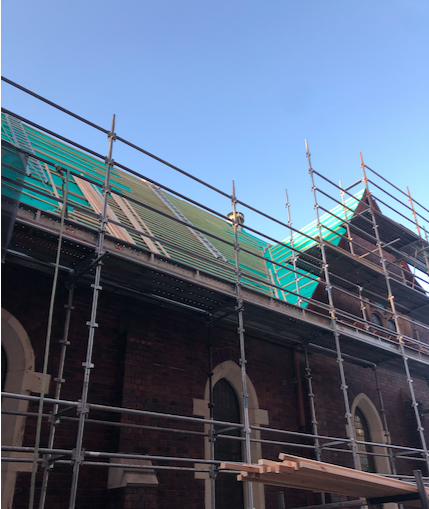
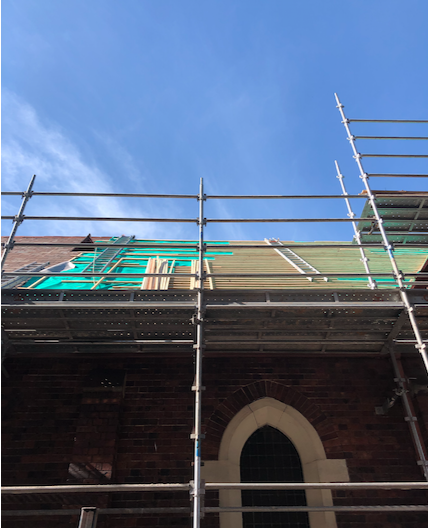
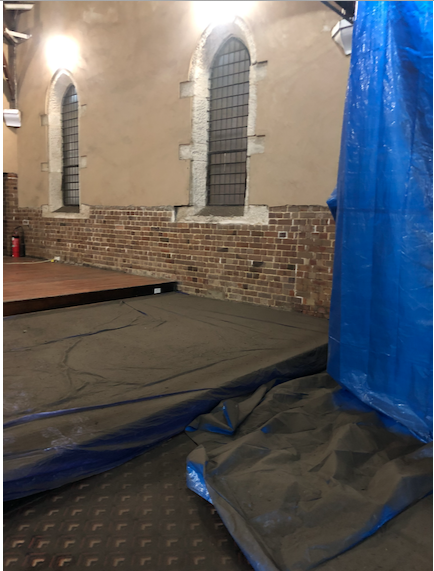
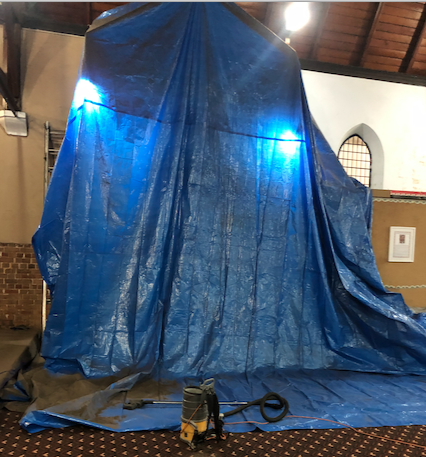
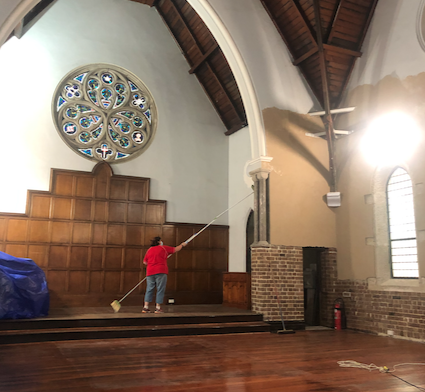
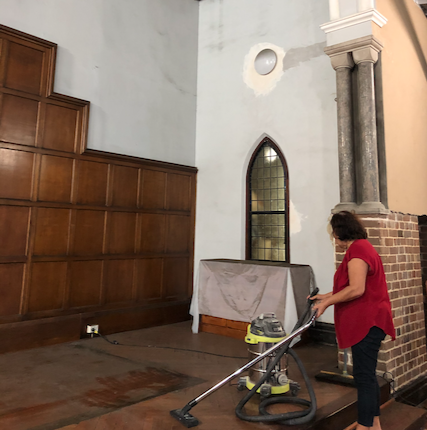
We welcomed Onyx and four generations of his Whanau to his Baptism today. Like Onyx, both his mum and aunt (Godmother) were Baptised as one year old children by Archdeacon Karipa. As Archdeacon Karipa shared, this is generational history.
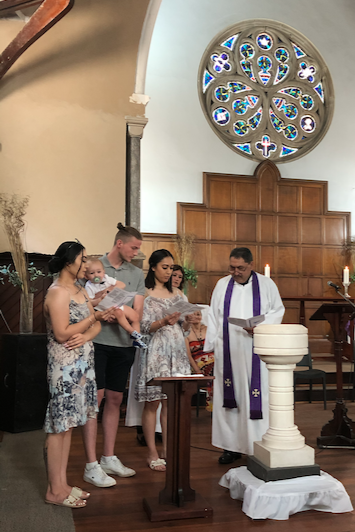
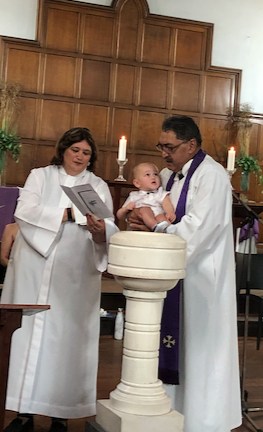
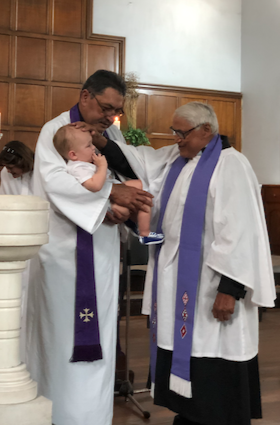
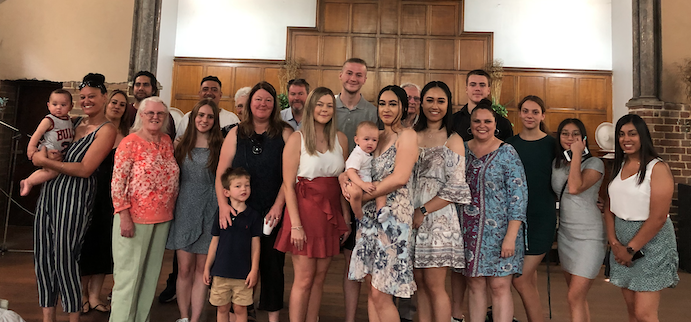
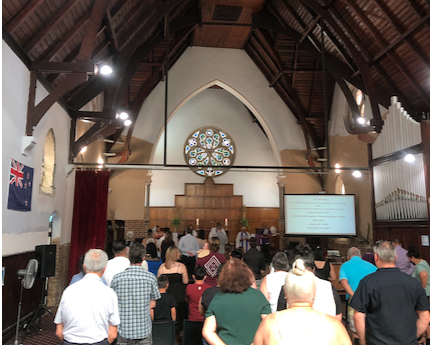
Theme: The Coming of the Lord
Sentence: `Heaven and earth will pass away,’ says the Lord, `but my words will not pass away.’ Mark 13:31
Collect: God of hope, When Christ your Son appears may he not find us asleep or idle, but active in his service and ready; through the same Jesus Christ our Redeemer. Amen.
Readings:
Isaiah 64:1-9
Psalm 80:1-7, 17-19
I Corinthians 1:3-9
Mark 13:24-37
Today is the first Sunday in Advent. And, Advent is the season where the church waits and prepares for both the birth of Christ at Christmas and the return of Christ at his Second Coming. Advent is not just a season of the church year. It’s a reality of life. It happens in different ways and it comes at various points in life, not just the four or five weeks before Christmas.
“In those days … the sun will be darkened, and the moon will not give its light, and the stars will be falling from heaven, and the powers in the heavens will be shaken.” These are Jesus’ words to his disciples. The disciples have been admiring the temple and they are impressed. Jesus, however, is telling them that change is coming. Their world is going to fall apart.
If you have ever experienced significant change in your life, whether you wanted it or not, you know about “those days.” So you also know about Advent. You know what it’s like to enter the darkness of change. All change, whether welcome or unwanted, brings some kind of loss to us. It’s a dark place. It may be the loss of a relationship, the loss of a loved one, the loss of what is comfortable, familiar and safe. Regardless, the world as we have known it has ended. Covid 19 is a good example, we as a church must change and we are!
You see, the Advents of our lives set before us important questions. How will we find our way forward when the usual lights that illuminate our path no longer shine? What do we do when it feels as if our world is falling apart? Where do we go when it seems as if darkness is our only companion and God is no where to be seen?
We all go through life changes, and we all experience dark times in our lives. But the dark times of life are threshold moments. And the temptation is to quickly do something; to fix it and to get back to what used to be. But the God of Advent doesn’t allow that. We can never go back to the way it was before the lights went out. God doesn’t undo our life. God redeems our life. Advent is not about the losses in our lives it’s about the hope and coming of what will be. That hope and coming is the Son of Man, Jesus the Christ. The presence of Christ is the ultimate answer to every prayer, to every light loss we experience in life.
Every time we tell the Advent story of our life we echo the prophet Isaiah’s cry, “O that you would tear open the heavens and come down” (Is. 64:1 ). And God does. God is faithful. God strengthens us to the end. In the midst of our losses we lack nothing as we await the revealing of our Lord Jesus Christ. (1 Cor. 1:7-9).
You see, the Advent times of life are times of waiting. In Advent we live in-between what was and what will be. We are neither here nor there. We are in-between. They are times of transition and it’s hard, sometimes even impossible, to see the way forward. If we allow them too, the dark threshold places of life can draw us deeper into the divine mystery. They remind us that we don’t know everything. We don’t see all possibilities. We can neither predict nor control anything. We are not in charge. Advent challenges us to give up our usual sources of understanding, to let go of our habitual ways of knowing, and to question our typical ways of seeing. Advent invites us to receive the God who comes to us in the darkness of life.
At some point our world falls apart, life changes, or the lights go out. More often than not we see this as the end. When these things happen, Jesus says, remember the fig tree. Read the signs correctly. When its branch becomes tender and it puts forth leaves you know summer is near. So also when the darkness overtakes your life know that the Son of Man is near. Christ’s presence, our healing, and salvation, are always taking place in the dark and messy parts of life. We have not and never will be abandoned to the darkness.
“Be alert,” Jesus warns. He commands us to “Keep awake.” Darkness is not our enemy as much as is falling asleep. We fall asleep whenever fear controls our life, when hope gives way to despair, when busyness equals goodness, when entitlement replaces thanksgiving, when we choose what is comfortable rather than life-giving. Whenever we think our life is over, that darkness is our final reality, that we have been abandoned, or that loss and darkness are our only reality then we have fallen asleep.
To often we allow the darkness to deceive us into believing there is nothing worth waiting or watching for. So we close our eyes. We fall asleep and we become part of the darkness. We refuse to see the One who is always coming to us. The danger in the darkness is that we don’t give our eyes time to adjust. We don’t trust our night vision. Night vision is not about the light around us but the light that is within us, a light that can never be extinguished.
Advent asks us to trust the Coming One more than the darkness. It means we must sit, listen, wait and watch. That is the opposite to what most of the world believes and what our society rewards. We must show up every moment of our lives not just in spite of but because of the darkness. To show up and be present in the darkness of life is some of the hardest work we will ever do. Run from our darkness and we run from God.
In the darkness of Advent we move slower, we listen more than we speak, we hold questions rather than answers. We wait expectantly but without specific expectations. Waiting in darkness is an act of faithfulness and surrender to the Coming One. Waiting becomes our prayer, a prayer that is and will be answered by God’s presence.
Closing Prayer:
God of hope, When Christ your Son appears may he not find us asleep or idle, but active in his service and ready; through the same Jesus Christ our Redeemer. Amen.
The Venerable Kaio Karipa
Chaplain
Sydney Maori Anglican Fellowship Church of Te Wairua Tapu
www.tewairuatapu.com.au
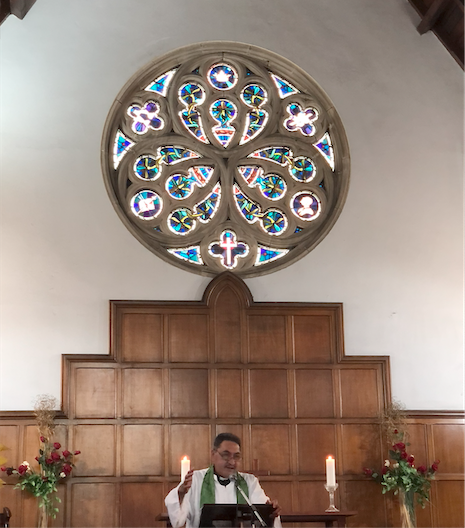
Theme: The Reign of Christ
Sentence: Come, you that are blessed by my Father, inherit the kingdom prepared for you from the foundation of the world. Matthew 25:34
Collect: God of majesty and glory, you reign over all. In the midst of the powers and principalities of this world, give us clarity to swear our allegiance to the only true sovereign, to care for the least of our sisters and brothers and to dedicate our lives to the coming of your kingdom. Through Jesus Christ our Liberator, who is alive and reigns with you, in the unity of the Holy Spirit, one God, now and forever. Amen
Readings:
Ezekiel 34:11-16, 20-24
Psalm 100
Ephesians 1:15-23
Matthew 25:31-46
Our theme for today is the reign of Christ. And, Christ’s reign is over the least of these according to Matthew.
It’s obvious that Matthew gets what Jesus is saying. He has no doubt about who’s in and who’s out. No questions. It’s all pretty simple for him. Feed the hungry. Give the thirsty something to drink. Clothe the naked. Welcome the stranger. Care for the sick. And, visit the prisoner. I’m sure it’s pretty clear to you because as Christians this is what we do.
But, apparently, this isn’t so. I wish it were as easy as going through a check list and categorising people as either a sheep or a goat, those who cared for “the least of these” and those who didn’t. You’re in, You’re out! Sorry you don’t make the cut, but you do. See, it’s not that easy and I know it wouldn’t be easy for you to choose.
What happens when you don’t help someone? I get confronted with this all time, I see homeless persons sleeping under the bridges every Sunday on my way to karakia. Am a goat? For not stopping and helping them. Am I bound for the eternal fires of punishment. I don’t know. Because I try to make up for it by helping others less fortunate. And, I know we as a church are always welcoming. All people are welcome here. We provide a beautiful clean building for karakia every Sunday and we’ve always provided a kai, even if it’s just a cuppa tea and biscuits. So are we good sheep? Righteous? Blessed by the Father? And bound for eternal life? I don’t know.
You see, it’s just not that easy categorising ourselves as either a sheep or a goat.
The reality is, we are both. I reckon each of you has a story just like mine; a time when you fed, clothed, visited, cared for one of the least of these, and another time when you just drove past, looked away, or pretended not to see a man or a woman asking for money, food, work, or some other help. I could give you a list of reasons to defend and justify my choices of when and who I help. But I don’t think that’s what today’s gospel is about. It’s not about telling the truth that confronts others. It’s about telling the truth about my life and your life. It’s about getting really real with our lives and our circumstances.
You see, the least of these, always seem to have a way of revealing to us, the truth of who we are and what our life is about. They do that so much more clearly rather than those I consider to be an equal or those I consider to be above me. The least of these are in all our lives. They don’t always fit our stereotyped images. Sure, it might be the person on the street corner asking for a handout. It might be a mother asking for food or someone who just got out of prison, again. Sometimes, though, it’s the ones who live under the same roof as me or sits across the table from me. And it’s not always about their physical needs. The least of these also have emotional, psychological and spiritual needs.
The least of these are in all our relationships. They are the people over whom we have power and control. The ones who have less resources and options than we do or they are overwhelmed by life and lack support. They are the ones we can do whatever we want to them and not really worry about their response. We threaten or intimidate them simply because of who we are, what we have and what we can do. So, who are the least of these in your life? Some maybe anonymous. But it might be someone sitting right next to you.
We all want to make a difference. We want to make a difference in the life of another, in the church and in the world. Maybe that’s why we sometimes struggle with our decisions and the choices we make. It’s the reason we ask guidance from others. It’s the reason we pray for God’s help because deep down we really do want to make a difference and do what’s right.
Well, I have some good news and some bad news for you. You don’t have to try to make a difference. Quit trying. Because you’re already making a difference. Every single one of you is making a difference. Even I am. But here’s the bad news. I don’t know if we are doing it for the good or for the bad. We often don’t really know. The people in today’s gospel, have no idea what difference they are making. They are just going on about their lives. One cared for the least of these and the other didn’t. They seem oblivious as to the consequences or effects of their actions. They both ask the same question. “When did we see you?” But let’s not take this story literally. Let’s not make this into a search for the least of these so we can be helpful and caring and get to heaven. Don’t start counting and keeping score of how many people we helped and how many we passed by, overlooked, or said no too. Do we just total up the two columns at the end of our life and see which is greater, those we cared for or those we didn’t care for? I don’t think that’s what today’s gospel is all about. That’s too easy. We already know we should help and care for one another.
This story is all about naming the reality in which we live. It’s a reality that pulls us in different and sometimes opposite directions. It’s a reality in which we often contradict ourselves. It’s a reality in which we always have choices before us and what we choose always makes a difference – for good or bad. It will always matter and always make a difference in someone’s life. Own your realities.
Maybe the goat and sheep metaphor worked in Jesus’ time but I don’t think it makes much sense to people today. We need a new metaphor. We need a new way of understanding what’s going on. Maybe what’s really being said is that there are two ways. We are pulled by God in one direction and our humanity in another. Or we could see it as the conflict and contraction between our humanity and our in-humanity. Another way would be to say that we live in the light and follow a path of light and we also live in the darkness and follow that path. It’s never just one or the other. It’s always both.
If we are really honest with ourselves, if we look deep with in us, we will see our humanity and our in-humanity. We will see both our light and our darkness. What if this story isn’t so much about assigning reward or punishment that determines an eternal location? Maybe it’s pushing us to look a the truth of our lives, to look at the choices we make here and now and to be aware that our choices do matter. You see, those metaphors and the choices they present are always coming to us. Look at the headlines in the news and you can see the choice between light and darkness. World leaders pushing their politics and agendas. How every country is dealing with covid19 but the death toll keeps raising. How our people are being treated in this country. We may not be guilty for what’s going on around us but we are all responsible. We are responsible for the choices we make – to choose light, to choose life and to choose to help another. What does it mean for you and me to choose light in the aftermath of any event in our lives? What does that look like in each of our individual lives?
These are not choices that live outside of us. They live in each one of us. How we choose begins to set the direction for our lives. I don’t think any of us get to that final place – whatever it is or however we understand it – overnight. It’s not a one time event or a single decision. It’s a series of choices and the further down the road we go, whether it is the road of light or the road of darkness, the harder it is and the longer it takes to return. Maybe we even reach that point of no return, a point where we just can’t find our way back. That’s a judgment on our life but it’s a judgment each one of us makes and chooses for ourselves. A King or Queen, sitting on the throne of their glory, simply names what is and what they see. So what do you see when you look at your life? What are the least of these showing you?
Everyone of you could look at the situations you are in today and see choices being made between light and darkness. These choices matter not just for you but also for another human being, choices that will affect their life for good or bad. We have the ability to open the channels of life, beauty, generosity, justice and compassion, just as we have the ability to block and close those channels down.
So don’t hear this story as a final judgment on your life. Hear it as a wake up call. Let it be the chance to see yourself through the eyes of someone less than you. What do they see? Is that who you want to be? What choices will lead you on the path of light? What choices will help you discover the light and beauty within yourself and within the other? That light which describe who we most authentically are. But I also know that that light and beauty can be cruelly tested by the vulgar, the ugly and the violence in our world. And yet, the choice remains; light or darkness. Who and how do you want to be? What will you choose?
What if we approached every person, every place, every circumstance and every choice as if we see Christ, and if we don’t, if we can’t see Christ, what if we approached every person, every place, every circumstance and every choice, as if Christ sees us? Either way there is a seeing taking place. What if we allowed those seeings to push us deep into ourselves to uncover, rediscover, or maybe even discover for the first time, the light that is truly who you are, and in that light we made our next choice? What if we made our next choice based not on the truth of the other’s life but on the truth of our own life? Sometimes we would choose yes and other times we would choose no. But every time we choose it’s in favour of the powerless one.
That’s what the least of these or powerless people do for us. They set a choice before us, and it’s not just a choice to help or not help. It’s a human choice – a choice that has a face, a name, a life, hopes, fears and needs. It’s a choice between our light and our darkness, our humanity and our in-humanity.
A choice awaits each one of us today. What will we choose? And, who will we be?
The Venerable Kaio Karipa
Chaplain
Sydney Maori Anglican Fellowship Church of Te Wairua Tapu
www.tewairuatapu.com.au
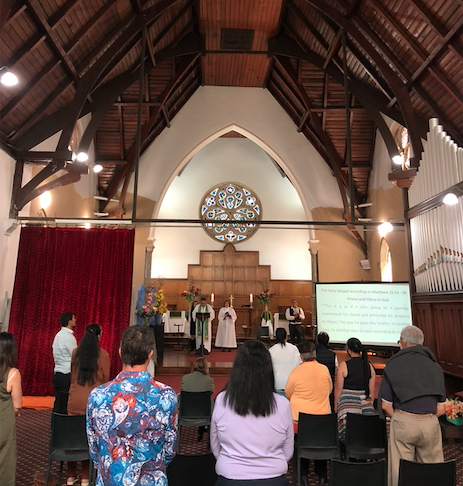
Gifts and Talents!
Sentence: But since we belong to the day, let us be sober, and put on the breastplate of faith and love, and for a helmet the hope of salvation. Thessalonians 5:8
Collect: God our creator, you entrust each of us with great treasure. Help us to be responsible stewards of the gifts and skills you have given us. May we honour the trust you have in us and use our talents as generously as you have given them. Through Jesus Christ our Liberator, who is alive and reigns with you, in the unity of the Holy Spirit, one God, now and forever. Amen
Readings:
Judges 4:1-7
Psalm 123
1 Thessalonians 5:1-11
Matthew 25:14-30
Tena koutou e te whanau o te Wairua Tapu.
In today’s gospel reading, Jesus tells his listeners a story about the talents and the Kingdom of God. He says, “It’s like a man who is going away on a journey, and he leaves his servants with a certain amount of money- each according to their ability. To the first he gave 5 talents, to the second, 2 talents and to the third servant, 1 talent.” The servants are entrusted with something special and they each need to decide what to do with what they have been given.
The first servant takes his talent or his gift, and invests it; and through smart management, sees the talent start to grow. In fact, he is able to double the owner’s original amount. The second servant, does the same thing. He takes his two talents, and is able to double what he has been given. Now the interesting thing about both of these servants, is that they were able to take what the master had given them, and they were able to recognise that what they had been given by the master was meant to be used. Only in the decision to risk using what they had been entrusted with, were they able to multiply that gift for the use in the Kingdom of God.
For both of these servants, it was a leap of faith, to risk perhaps losing the money, or if we are talking about a real talent, or spiritual gift, to risk making some mistakes. But they did it, and because of that ability to take real chances, to step out in faith, they were able to do big things and get a pat on the back when their master returned.
For some reason, the third servant wasn’t able to take the same risk. He took his portion of money and he buried it in the ground. Maybe he was protecting the owner’s money or maybe he was just keeping it safe. But this servant, for whatever reason, wasn’t able to take that leap of faith to try to use what he had been given.
Sometimes we find ourselves in similar situations- where we are given opportunities to use our talents, our time, our energy and our spiritual gifts- we see an opportunity, but we are to afraid that we might fail or we might use them in the wrong way. We might see a chance to do something special, something that we know we have the ability to do, and we have the resources, but we lack the courage to step out in faith and use what God has given us.
In my own life- it took me a long time to answer the call to ministry- to take the leap of faith and go to theological college. I kinda knew I had gifts for ministry- people would tell me, you’d make a good minister, but I was always a little bit apprehensive! Why? Because I was already involved with the church and I didn’t want to get that close to God. But in reality, I didn’t want to fail God, be judged by others or risk looking stupid in front of people. It wasn’t until I was willing to step out in faith and risk everything, that I was able to see, I actually could be used by God to do more ministry than I first thought. In life, we learn that each of us are entrusted with talents or resources that God gives us to use- not to bury them.
But what if this story is not about God being the master or it’s not even a story about the Kingdom of God at all! Instead, its a worldly story. The master is a very wealthy landowner. He’s rich beyond all measure, and he leaves his three top employees a certain amount of his property to take care of while he goes on a trip and he gives each of them a portion according to their power or status in his business.
If we read this story in it’s context, the people who Jesus would’ve been talking to would’ve been peasants in Palestine. When he mentioned a wealthy landowner, and the talent, worth millions of dollars, it would’ve been very clear to the peasants who the wealthy person represented. The people would have known right away that Jesus was speaking of the people who owned their homes, the ones who would raise taxes, the ones with the power to alter the laws, put constraints on their freedoms, and to keep them in a state of poverty.
When Jesus said that the rich man had put his 3 top guys in charge, the people would’ve also known what that meant; that the three men would have orders to multiply the money in anyway they saw fit- including putting even more pressure on the poor. The system was corrupt, and the rich continued to get richer and the poor poorer. Is this at all sounding familiar to you? Throw in racial profiling, deportations of our people and you would think Jesus was talking to us.
Anyway, let’s get back to the story. When the rich man returns, the first two servants get rewarded for doing what they were charged to do… make money. The third servant, because he hid his talent, gets punished- he’s cast out. But it’s this third servant, in this different perspective, who might be called the hero. Because it’s him who saw the master for who he really was. He saw what he was supposed to do and realised that in order to do it, he would have to buy into and support a corrupt system. But he refused. And he tells his boss- “I know you are a hard man- I don’t want any of this… here’s your money back. ”
There’s a key line in this parable, in verse 26, when the master asks the third servant- ‘so… you thought I was wicked, did you? That I reap where I don’t sow?’ The master was calling him out on his perception…So the boss sacks him! “You go be a peasant yourself now- you can’t have this life of luxury anymore. ”
In other words, the third servant knew the risk he was taking. He was willing to risk being poor himself, to have to live among the oppressed, in order to not participate in the corruption. It was his ultimate sacrifice for the people. In this interpretation, Jesus is giving the people an illustration of how the world is- and that sometimes we must be willing to risk and sacrifice our own comfort for the greater good- sometimes we have to take even one step against the system- not buy in- not condone the oppression around us. Social justice….There seems to be a lot of this happening today, and yet, governments still want to keep the people poor.
So, there are at least two ways to interpret this story- but a common thread that runs through both of these interpretations is the perceptions of each of the servants; what they thought about the master that determined his choice of action.
The questions I have for you today, both as individuals and as a church is, how do you perceive God? What is your relationship with the God who has given you life? And, how do we view this creator of all things who has entrusted us with gifts and talents?
If we are like the third servant, and we see God as an angry harsh God, waiting to hit us over the head with a lightning bolt when we mess up, then there’s no way we can risk anything- there’s no way we will ever be able to step out in faith to use what God has given us… if we are afraid of consequences- if we are motivated by fear, then we’ll never be able to do great things and our gifts will never grow. But you’re thinking, ‘The third servant DID get punished, the master DID turn out to be harsh…. He got thrown into the street with the gnashing of teeth stuff!’ And I would say to you that it was his own interpretation, his own perception of who God is that put him there- because that’s the only place that is open to you if your view of God is a angry God and you put yourself forever in a place of torment. Don’t worry I grew up with an angry God, and I loved him!
But how can we be free to enjoy the wonders of salvation through Christ if your image of him is one of fear and condemnation? Don’t we profess to believe that ‘there IS no condemnation for those who are in Christ? That nothing can separate us from the Love of God in Christ?’ (Romans 8)
In the first two servants held an understanding of who the master was- and knew that when it came right down to it, there was really no risk at all. They understood that they serve a wealthy, beyond measurable, well meaning and generous God, who has given out more than we can ever think, see or imagine. We serve a God who has blessed us with gifts beyond our imagination and that the only risk involved is in not using those gifts at all. So there is no fear of messing up, because when you’ve experienced Gods love, you realise that love is perfect, and perfect love casts out all fear. And yet, maybe some of you are thinking; I know… I know… I have to do it, I know I have gifts, I know I’m supposed to be doing something, and I’ll do it…. I’ll do it…. But not yet… the timing isn’t right… I have to be more prepared first, I have to get more money first, I have to have more time first… I‘ll do it… tomorrow… well you know what whanau? Tomorrow isn’t promised!
We only have today to work with, and we can’t afford to let one more day pass without accepting the opportunities that God has put before us. We can’t wait any longer before we use our gifts, our talents, our money and our resources for the things that God intends for us. We can’t let one moment pass before we accept the graciousness and the abundance that God has poured out on each one of us, to allow us to be all that we are destined to be in Christ. The opportunity is there for each of us to be more than we ever dreamed of, and for our gifts to be used in ways we never thought possible.
It’s the ‘what would you do if you could do anything’ moment- you know, the ‘what would you do if you weren’t afraid’ moment, the ‘Peter getting out of the boat moment,’ even the ‘I’m getting out of bed on my only day off (Sunday), to go to church’ moment. It doesn’t have to be big, whanau, but it’s the moment that you realised that there was more out there that God was calling you to do than you already were. Excellence and greatness is within your grasp because you felt just a hint of it inside you and you allowed yourself, maybe for the first time, to dream of tapping into it. That’s my role now, to challenge you. What are you doing?
And God continually pours it out, saying “here you are a teacher: teach my children” “Here you are a musician: then sing and play for me,” “Here’s some money: do something special with it”… “Here’s JOY! I’ve given it to you… use it! be joyful… here’s hope… share it with everyone! Here’s peace… spread it around…”
IS there an end to the blessings we’ve been given? My prayer for you today is that you can Feel what God has given to you, BE the unique person God has made you…LIVE the dreams God has shown you what God has planned for you to be. For God knows the plans for you… to prosper and not harm.. to give you hope and a future… and you know what? You can’t mess up God’s plan… when it comes right down to it… there’s no risk at all… just take the step..
God bless all of you today…
The Venerable Kaio Karipa
Chaplain
Sydney Maori Anglican Fellowship Church of Te Wairua Tapu
www.tewairuatapu.com.au